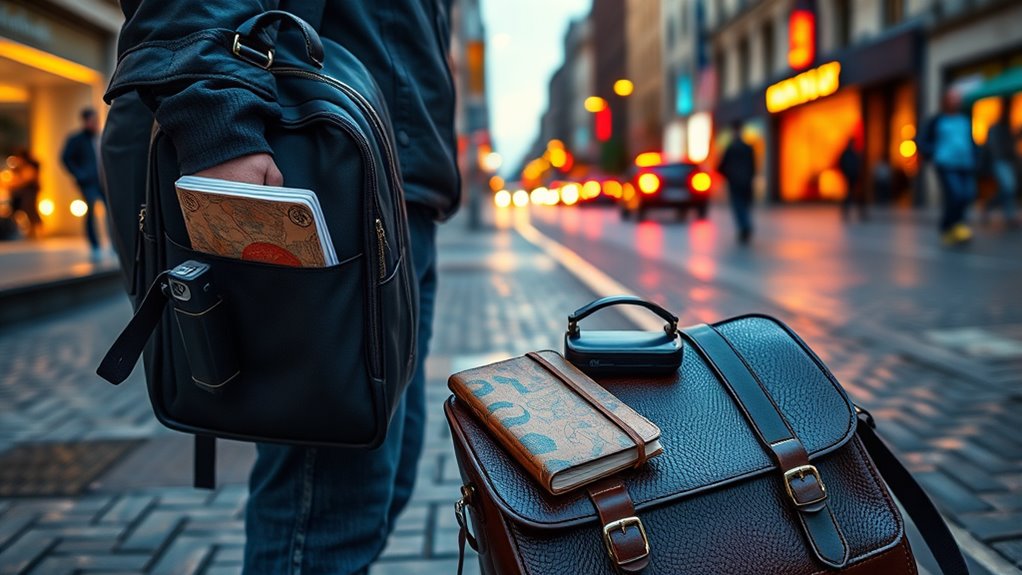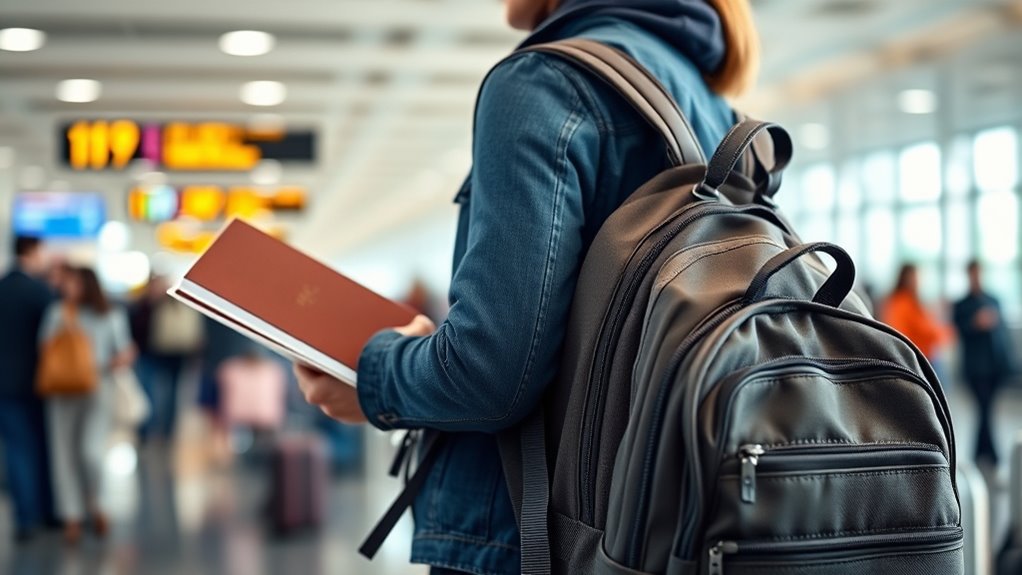To guarantee safety during solo travel, you should set up reliable safety nets like sharing your itinerary with trusted contacts, using real-time location sharing, and carrying emergency tools such as a fully charged phone, a power bank, and a whistle. Stay aware of your surroundings, stick to well-lit areas, and trust your instincts. Being prepared and connected helps you respond quickly to unforeseen situations. Keep exploring to discover more effective safety strategies for your trip.
Key Takeaways
- Share your itinerary and real-time location with trusted contacts for quick assistance if needed.
- Use emergency apps and local emergency numbers to access help instantly in unfamiliar areas.
- Carry a fully charged phone, portable charger, and essential communication tools at all times.
- Research safe neighborhoods and avoid risky zones to plan secure routes and activities.
- Join online travel communities to gain local insights, support, and reassurance during your trip.

Are you ready to set out on a solo travel adventure? Before you pack your bags and hit the road, it’s vital to prepare safety nets that will keep you secure and confident throughout your journey. The first step is to research your destination thoroughly. Understand the local customs, transportation options, and areas to avoid. Knowing which neighborhoods are safe and which ones aren’t can save you from unnecessary risks. Check travel advisories and consult trusted sources like local tourism boards or expat communities online. This research arms you with knowledge and helps you plan your routes, accommodation, and daily activities more safely.
Next, guarantee your communication tools are reliable. Carry a fully charged phone with international coverage or a local SIM card. Download essential apps like maps, translation tools, and local emergency numbers before you leave. Share your itinerary with a trusted friend or family member, and check in regularly. Setting up a check-in schedule provides peace of mind for both you and your loved ones. Consider installing a safety app that allows real-time location sharing or quick emergency alerts. These tools can be lifesavers if you find yourself in an uncomfortable situation or if plans unexpectedly change.
Packing smart is another vital safety net. Bring along a basic first aid kit, necessary medications, and copies of important documents like your passport, visa, and travel insurance details. Keep digital copies stored securely in the cloud or emailed to yourself, so you can access them if needed. Also, pack essentials like a flashlight, a power bank, and a whistle. These small items can be invaluable if you find yourself in a tricky situation or need to signal for help. Dress appropriately for the local climate and cultural norms to avoid unwanted attention or misunderstandings. Additionally, understanding the importance of projector contrast ratio can be helpful if you plan to relax with some entertainment in your accommodation, ensuring a clear and enjoyable viewing experience.
Trust your instincts at all times. If something feels off, don’t hesitate to remove yourself from the situation. Stay aware of your surroundings and avoid distractions like excessive phone use when in unfamiliar areas. When you’re out at night, stick to well-lit streets and busy areas. Keep your belongings close and secure to prevent theft, and don’t flaunt valuables. By maintaining situational awareness, you’re actively reducing your risk of becoming a target.
Finally, build a network of support. Join online forums or social media groups for travelers in your destination. Connecting with others can provide valuable tips and reassurance. Plus, knowing there’s a community out there can boost your confidence and help you feel less isolated. Remember, preparation isn’t just about packing; it’s about setting up a safety net that catches you if something goes wrong. With these measures in place, you’ll be more prepared to enjoy your solo adventure safely and confidently.
Frequently Asked Questions
How Can I Find Reliable Local Emergency Contacts Abroad?
You can find reliable local emergency contacts abroad by researching ahead of time through official government travel websites and your country’s embassy or consulate. Save their contact info on your phone and write it down in a local language if needed. Ask locals or hotel staff for trusted emergency numbers, and join online travel communities for tips. Always keep a list handy, so you’re prepared if an emergency arises.
What Insurance Coverage Is Essential for Solo Travelers?
Think of insurance as your safety net in a trapeze act—you need it firmly in place before you leap. Essential coverage includes medical expenses, trip cancellations, and emergency evacuation. For example, I once sprained my ankle abroad and was grateful for my policy’s quick ambulance service. Without it, I’d have faced hefty bills. Make certain your plan covers these essentials, so you can focus on your adventure without worry.
How Do I Prevent Theft Without Seeming Paranoid?
You can prevent theft without seeming paranoid by staying aware of your surroundings and keeping your belongings close. Use a theft-proof bag and avoid displaying valuables in public. When in crowded areas, hold your bag securely or wear it across your body. Trust your instincts—if something feels off, remove yourself. These simple steps help protect your valuables while allowing you to enjoy your trip confidently and discreetly.
Are There Apps That Enhance Solo Travel Safety?
Think of apps as your digital lifelines when you’re exploring solo. Yes, there are great ones like SafetyApp, which shares your location with trusted contacts, or GeoSure, providing neighborhood safety scores. Additionally, apps like WhatsApp let you quickly connect with friends or local authorities. Download these before you set out, and they’ll serve as your safety net, giving you peace of mind and quick access to help whenever you need it.
How Can I Handle Language Barriers in Emergencies?
In emergencies, handle language barriers by downloading translation apps like Google Translate beforehand, and keep a list of essential phrases in the local language. Use visual aids or gestures to communicate urgent needs if apps falter. If possible, carry a card with your emergency contact info and medical details written in the local language. Remaining calm and patient helps ensure your message gets across effectively.
Conclusion
Planning ahead keeps you safe and confident on your solo adventures. Remember, over 70% of solo travelers feel more empowered after taking safety precautions like sharing itineraries and carrying emergency contacts. By setting up these safety nets, you’re not just protecting yourself—you’re opening the door to unforgettable experiences with peace of mind. So, prepare wisely, stay alert, and embrace every moment of your journey with confidence. Solo travel is truly a life-changing adventure waiting to happen.










